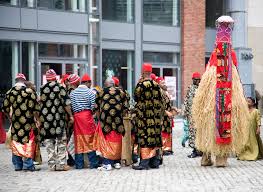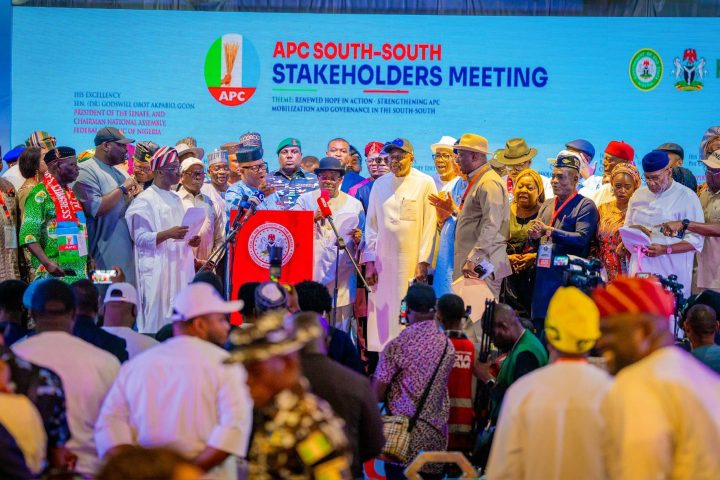By Chris Uchenna Agbedo
In an age dominated by digital transformation, the intersection of cultural heritage and technology offers unprecedented opportunities for sustainable development. For South-east and South-south Nigeria, where the rich mines of Igbo culture and language intertwines with untapped economic potential, this convergence could serve as a beacon for regional revitalization.
Speaking at the Business Summit on Sustainable Business Development for South-South and South-east Nigeria, held in Munich, Germany, I presented a position paper that explored the role of digital technology in mainstreaming Igbo language and culture. This initiative, I argued, has the capacity to reshape not only the cultural identity of the region but also its economic landscape, providing a model for sustainable growth.
Join our WhatsApp Channel
The Igbo Culture-Digital Nexus
The resurgence of interest in Igbo language and cultural heritage comes at a time when rapid advances in digital technology are redefining how knowledge is shared and preserved. South-east and South-South Nigeria can harness this synergy to bridge the gap between cultural preservation and economic innovation. This effort demands a recalibration of Igbo cultural heritage through digital technologies. From promoting language learning via mobile apps to establishing digital museums and ICT hubs, this paper outlined practical strategies for integrating cultural preservation into modern business governance. By leveraging digital tools, the Igbo people can position their language and culture as both a global asset and a driver of regional economic transformation.
Revitalising Igbo Language and Culture
At the heart of this initiative lies the need to revitalize Igbo language and culture. Technology provides a powerful platform for promoting and preserving this heritage. Digital learning apps like IgboLearn and Omenaka have already shown promise in engaging young audiences with interactive tools for language acquisition and cultural education. Virtual cultural experiences, powered by augmented and virtual reality, can bring Igbo heritage to life. Imagine walking through a virtual replica of the National War Museum in Umuahia or participating in a digital re-enactment of the New Yam Festival from anywhere in the world. Such initiatives not only preserve culture but also attract global attention, fostering cultural pride among the diaspora while boosting regional tourism. Youth engagement is another vital component. Young people are at the forefront of the digital revolution and are key to ensuring the sustainability of these initiatives. By integrating Igbo language and cultural studies into digital spaces like social media, we can ignite their interest and encourage participation.
Stimulating Economic Development
The economic potential of digitalising Igbo cultural heritage is immense. By treating culture as an asset, we can drive growth in areas such as tourism, education, and entrepreneurship. Digital museums and ICT hubs serve as platforms for showcasing Igbo arts, crafts, and history, creating opportunities for e-commerce and global partnerships. Blockchain technology offers another innovative avenue for cultural preservation and monetization. Blockchain can ensure the authenticity of Igbo art and crafts, providing transparency and value in global markets. Meanwhile, social media campaigns and influencer collaborations can amplify the reach of Igbo culture, attracting investment and generating revenue streams. E-commerce platforms dedicated to Igbo cultural products, ranging from traditional attire to literary works, can connect local artisans with international buyers. This not only empowers communities but also creates jobs and stimulates the regional economy.
Integrating Culture into Business Governance
For South-East and South-South Nigeria to fully realise the benefits of cultural digitalisation, its integration into modern business governance is essential. Cross-sector collaborations involving governments, private enterprises, and cultural organisations can create a robust ecosystem for innovation. Corporate practices must also embrace cultural sensitisation, ensuring that Igbo heritage informs decision-making and branding. For example, companies could adopt Igbo proverbs and idioms in their marketing campaigns, reinforcing cultural pride while appealing to local audiences. Empowering women and youth through digital platforms is another crucial step. By providing training in digital skills and access to resources, we can unlock the creative potential of these groups, enabling them to become cultural ambassadors and economic drivers. Furthermore, digital integration can address broader developmental challenges. For instance, digital platforms can support climate change adaptation by promoting sustainable agricultural practices rooted in Igbo traditions. Similarly, they can help alleviate rural-urban migration by creating opportunities for remote work and e-commerce in rural areas.
Strategic Framework for Digital Integration
To achieve these goals, a strategic framework is required. This involves Developing Digital Infrastructure (building reliable internet connectivity and digital hubs across the region); Enhancing Digital Literacy (providing training programs to equip communities with the skills needed to engage with digital tools); Fostering Public-Private Partnerships (encouraging collaboration between governments, tech companies, and cultural organizations); Leveraging International Support (engaging global stakeholders to provide funding, expertise, and market access). The Igbo diaspora, in particular, has a crucial role to play. By investing in digital initiatives and acting as cultural advocates, they can bridge the gap between local communities and global opportunities.
Lessons from Successful Initiatives
Several case studies demonstrate the transformative potential of digital cultural integration. Platforms like Omenaka and IgboLearn have already made significant strides in language preservation. Meanwhile, initiatives like Iroko TV and IgboFest showcase the global appeal of Igbo culture through film and festivals. These successes highlight the importance of innovation and collaboration. By building on these foundations, South-east and South-south Nigeria can scale up their efforts, creating a comprehensive digital ecosystem for cultural preservation and economic development.
Call to Action and Conclusion
As we look to the future, the digital mainstreaming of Igbo language and culture offers a powerful pathway for regional transformation. This initiative aligns with global trends in cultural preservation and sustainable development, positioning South-east and South-south Nigeria as leaders in cultural and economic innovation. However, achieving this vision requires collective action. Governments, private enterprises, cultural organisations, and international stakeholders must work together to create an enabling environment for these initiatives to thrive. The integration of Igbo language and culture into digital platforms is not just a cultural imperative but also an economic opportunity. By leveraging digital tools, we can preserve our rich heritage while driving regional growth and empowering communities. The journey ahead is ambitious but achievable. With the right partnerships and resources, we can create a legacy that celebrates Igbo culture, fosters economic resilience, and positions Southeast and South-South Nigeria as a beacon of sustainable development in a globalised world.
I extend my deep gratitude to the organisers of this summit – the South-South South-East Nigerian Investment Forum, the Nigerian-German Coalition for Human Development, and the European Igbo Community – for providing a platform to advance these ideas. Your efforts underscore the importance of collaboration in addressing the challenges and opportunities of sustainable development in Nigeria. God bless Nigeria.
Agbedo, PhD, FNIAS, MNAL. (Professor of Linguistics, University of Nigeria, Nsukka.)















Follow Us